Overview
Post-market study strategies in Chile are meticulously crafted to enhance research outcomes through strict adherence to the Instituto de Salud Pública (ISP) regulations, the utilization of local expertise, and the integration of real-world data. These strategies significantly bolster patient safety and study credibility, while also capitalizing on Chile's burgeoning commitment to healthcare innovation and cost-effectiveness. This positions the country as a formidable competitor in the global medical device arena, underscoring the critical role of collaboration in advancing clinical research.
Introduction
Chile is swiftly positioning itself as a pivotal hub for healthcare innovation and clinical research, propelled by a strong regulatory framework and an abundance of skilled professionals. Under the guidance of the Instituto de Salud Pública (ISP), the nation prioritizes rigorous post-market studies that not only safeguard patient safety but also bolster the credibility of research outcomes.
As the landscape transforms, researchers encounter distinctive opportunities to harness local resources, integrate real-world data, and align their studies with national health priorities. This article explores the multifaceted advantages of conducting post-market studies in Chile, underscoring the critical roles of compliance, collaboration, and cost-effectiveness in delivering impactful healthcare solutions.
Navigate Chile's Regulatory Framework for Post-Market Studies
Chile's regulatory framework for post-market evaluations is primarily governed by the Instituto de Salud Pública (ISP), which plays a crucial role in the approval and ongoing monitoring of medical devices. Researchers must thoroughly understand the ISP's specific guidelines, which mandate the development of post-market study strategies in Chile. This plan is essential for detailing how the device will be monitored for safety and efficacy following its market approval. Adhering to these regulations not only safeguards patient safety but also bolsters the credibility of research outcomes.
In 2025, the ISP continues to emphasize the importance of rigorous compliance, focusing on enhancing the integrity of clinical studies. Regular training and updates on regulatory changes are vital for researchers to remain compliant and informed, ensuring that they can effectively navigate the evolving landscape of medical device regulations in Chile. With a population of approximately 50 million inhabitants in Colombia, the demographic richness of the region enhances participant recruitment and facilitates collaboration with international research teams.
Various studies have demonstrated that successful post-market study strategies in Chile can showcase the potential for innovative solutions that align with local healthcare priorities. For instance, a collaboration between a biotech firm and a Chilean university led to the development of a telehealth solution, illustrating how adherence to ISP guidelines can unlock funding and support opportunities while fostering innovation in healthcare delivery. As noted by the bioaccess® content team, 'The commitment to rigorous standards and ethical practices positions the country as a competitive player in the global medical device arena, paving the way for future innovations that can significantly enhance healthcare delivery.'
Moreover, bioaccess® is committed to ensuring information security and client trust throughout the trial process, with established grievance and data protection procedures that address client concerns with compliance and transparency.
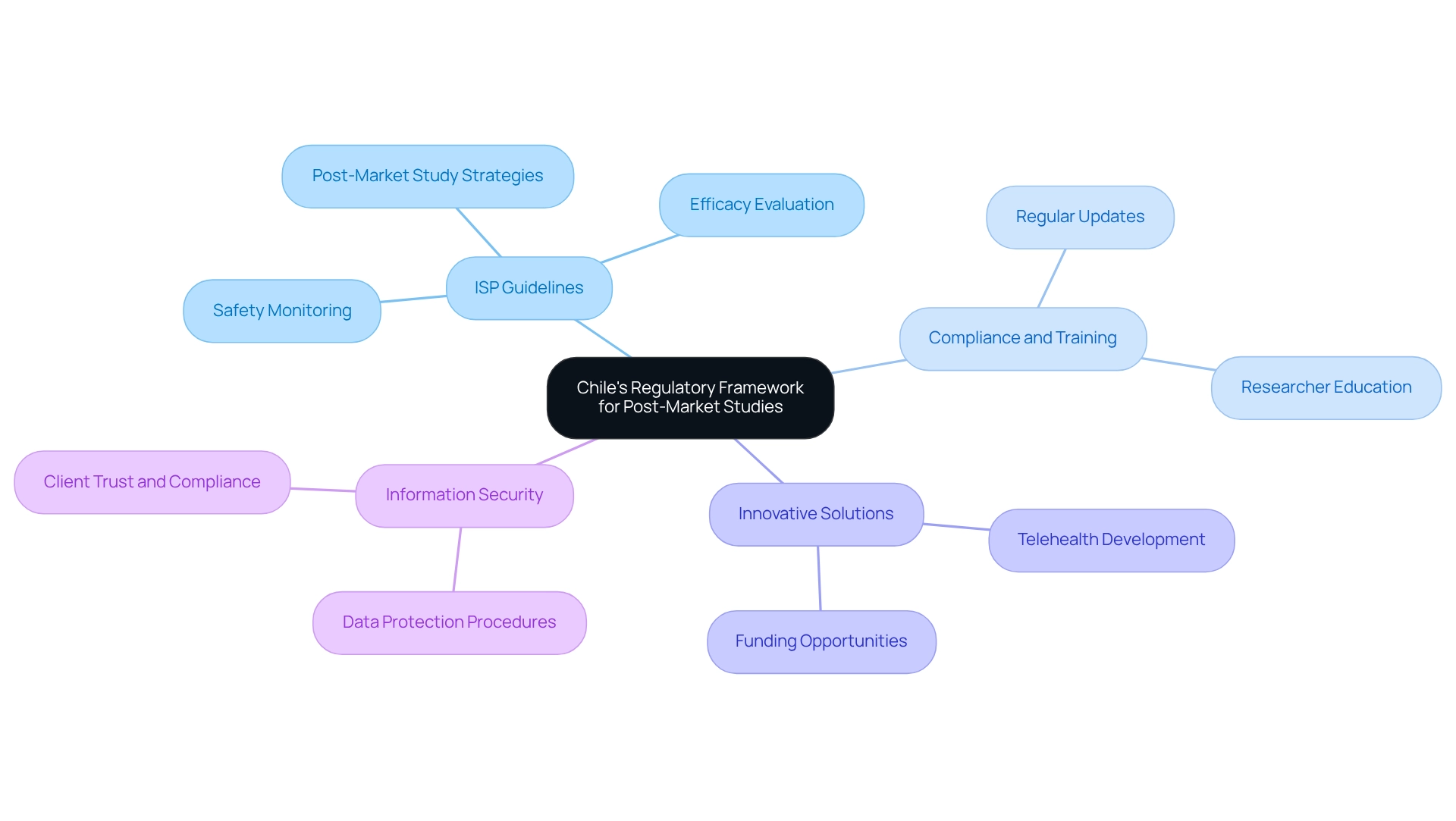
Utilize Skilled Medical Professionals and Research Facilities in Chile
Chile boasts a highly skilled workforce of medical experts, including doctors, nurses, and researchers, all adept at conducting trials and implementing post-market study strategies. Partnering with local institutions equipped with advanced technology can significantly streamline the investigation process. Notable institutions, such as Hospital Clínico Universidad de and Pontificia Universidad Católica de, have established protocols for medical studies that can be effectively leveraged to enhance the quality and efficiency of investigations. These partnerships not only facilitate patient recruitment and data collection but also improve the effectiveness of post-market study strategies in Chile, leading to more reliable and impactful results.
In 2025, the number of research professionals in Chile is anticipated to rise, reflecting the growing investment in the medical device industry, which has seen a 30% increase in funding over the past year. This growth underscores the potential for fruitful collaborations between study institutions and medtech firms, paving the way for innovative solutions in medical studies. Bioaccess® offers a comprehensive range of clinical trial management services, including:
- Feasibility assessments
- Site selection
- Compliance evaluations
- Trial setup
- Import permits
- Project management
- Reporting
These services ensure that trials are conducted efficiently and in accordance with local regulations.
As highlighted by the ISCI Team, "Innovative methods and contact-free epidemiological tools were implemented, which can serve as a reference for other researchers in similar situations or remote areas during the pandemic." Furthermore, the case analysis titled 'Collaboration for Vaccine Access' illustrates how the Chilean government established a scientific advisory committee to foster cooperation between local and international organizations for vaccine research and access. This initiative resulted in successful negotiations for vaccine procurement and a rapid national vaccination campaign. These examples underscore the effectiveness of collaboration within the Chilean context.
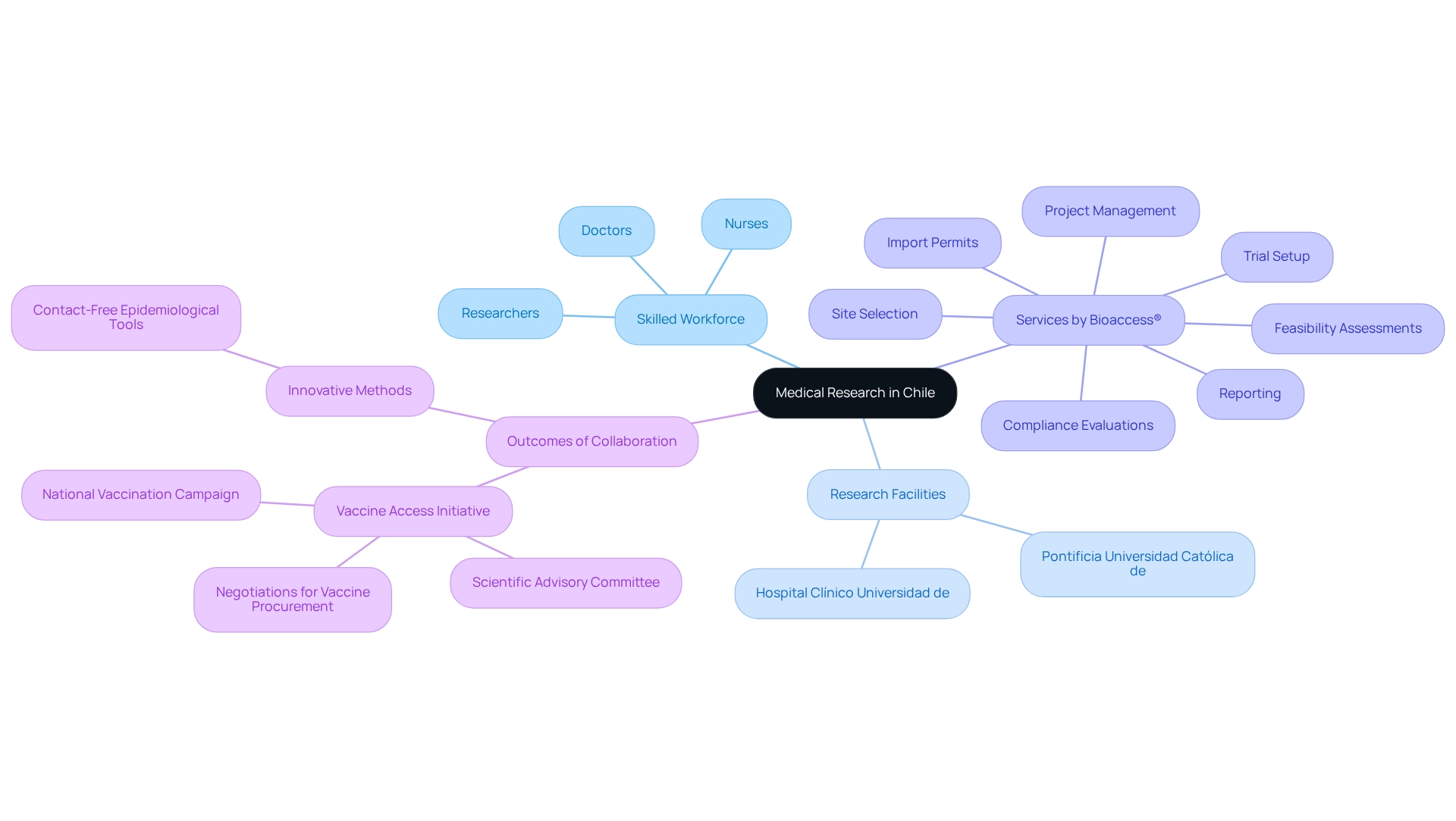
Maximize Cost-Effectiveness in Post-Market Studies in Chile
Implementing post-market study strategies in Chile presents a compelling opportunity for cost-effectiveness, primarily due to significantly lower operational expenses compared to other regions. To fully leverage this advantage, researchers should prioritize local resources by employing local staff and utilizing nearby facilities, which can yield substantial savings. Furthermore, harnessing existing information from prior research minimizes the need for extensive new data collection, thereby enhancing efficiency.
With bioaccess®'s expertise in managing post-market follow-up projects, including Early-Feasibility Evaluations and First-In-Human Trials, the application of agile project management techniques, such as Scrum or Kanban, can streamline processes, reducing delays and unexpected costs. These methods facilitate iterative progress and rapid adjustments, particularly beneficial in the dynamic landscape of medical research. Additionally, exploring funding avenues through regional grants or collaborations, such as those offered by Chilean government programs or partnerships with local universities, can provide essential financial support, making post-market study strategies in Chile not only viable but economically advantageous. Notably, with the country achieving retention rates exceeding 85% in trials, it emerges as a strategic location for conducting effective and economical research.
It is imperative to consider how the results of cost-effectiveness are sensitive to variations in vaccine pricing and efficacy, as these factors can significantly influence the overall financial feasibility of post-market evaluations. Moreover, contrasting the operational expenses of conducting research in Chile with those in regions like Western Europe, where trials may incur higher costs, underscores the financial benefits of pursuing post-market study strategies in Chile for medical inquiries. Additionally, the impact of Medtech research on local economies, including job creation and improvements in healthcare, further emphasizes the advantages of conducting studies in this region.
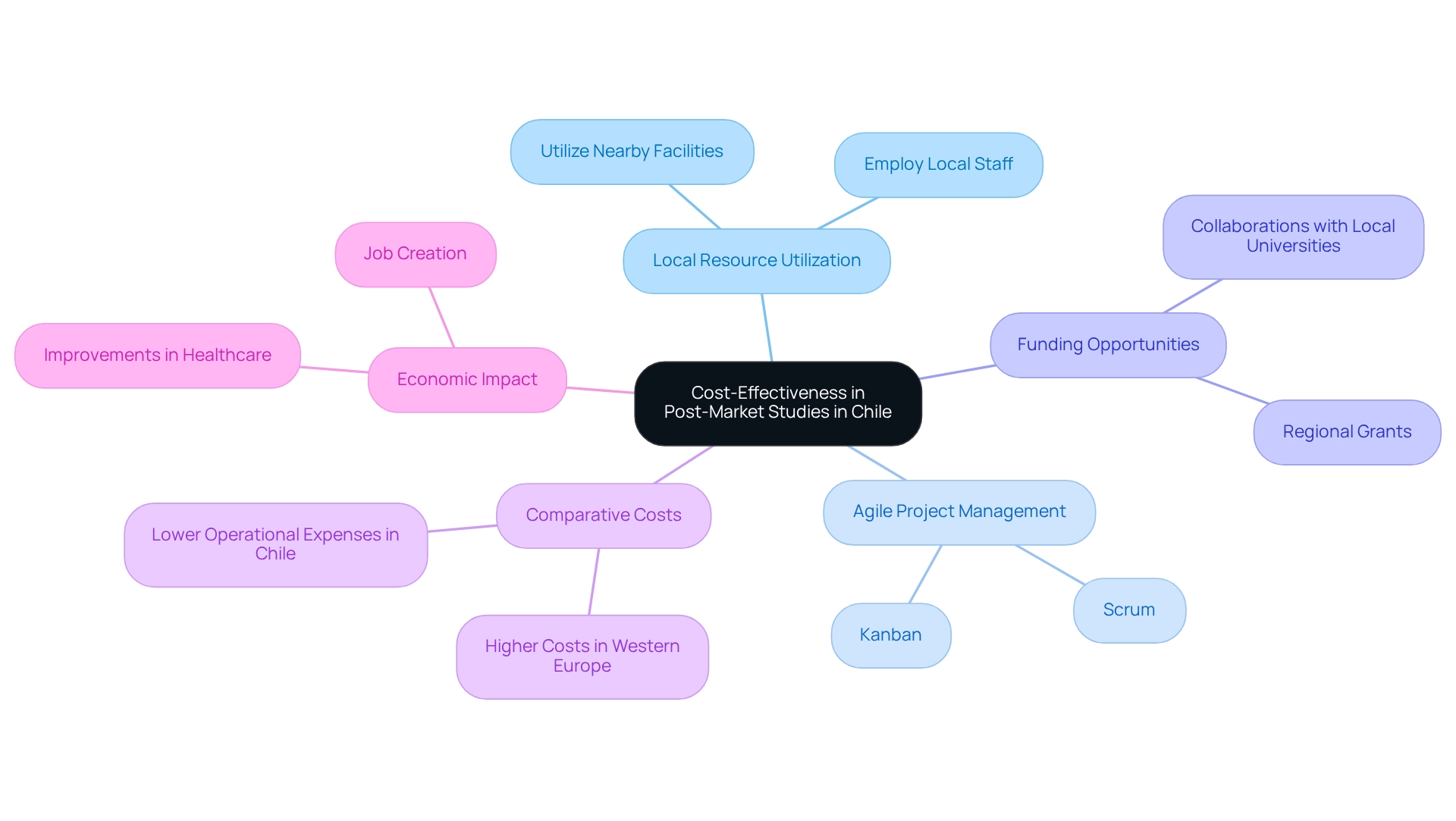
Incorporate Real-World Data for Enhanced Study Outcomes
Incorporating real-world data into post-market studies is essential for acquiring insights into a medical device's performance in daily healthcare environments. By utilizing information from electronic health records (EHRs), patient registries, and insurance claims, researchers can significantly enhance conventional trial data. This comprehensive approach not only broadens the understanding of device efficacy and safety but also aids in identifying long-term outcomes and potential adverse effects. The oncology sector, accounting for roughly 34% of the worldwide real-world evidence solutions market in 2024, underscores the increasing relevance of real-world data in medical studies, particularly in comprehending how treatments function across diverse populations.
The FDA's Advancing Real World Evidence Program initiative, revealed in October 2022, emphasizes the regulatory backing for incorporating real-world data techniques into health studies. This initiative seeks to enhance the utilization of real-world evidence for new labeling claims, further highlighting the significance of such data in post-market evaluations.
As Kostka noted, "In these high stakes, high reward situations where we’re looking to get therapies on market for groups that have a serious need, there’s a lot of interest." This perspective emphasizes the urgency and importance of integrating real-world data into clinical studies.
Successful case examples, such as Cerner Enviza's partnership with the FDA to create AI applications for drug safety, demonstrate how real-world data can improve monitoring and comprehension of drug outcomes across extensive populations. This collaboration is anticipated to enhance drug safety monitoring, showcasing the practical implications of real-world data integration.
In the context of Chile, post-market study strategies that involve collaborating with local healthcare providers to access EHRs can facilitate a more thorough analysis, ultimately enhancing the quality of study outcomes. With bioaccess® at the forefront of managing post-market study strategies in Chile, their expertise in navigating regulatory landscapes and ensuring compliance will be crucial in facilitating informed decision-making. As the landscape of post-market study strategies in Chile evolves in 2025, the integration of real-world data will be essential in advancing medical technology and enhancing research outcomes.
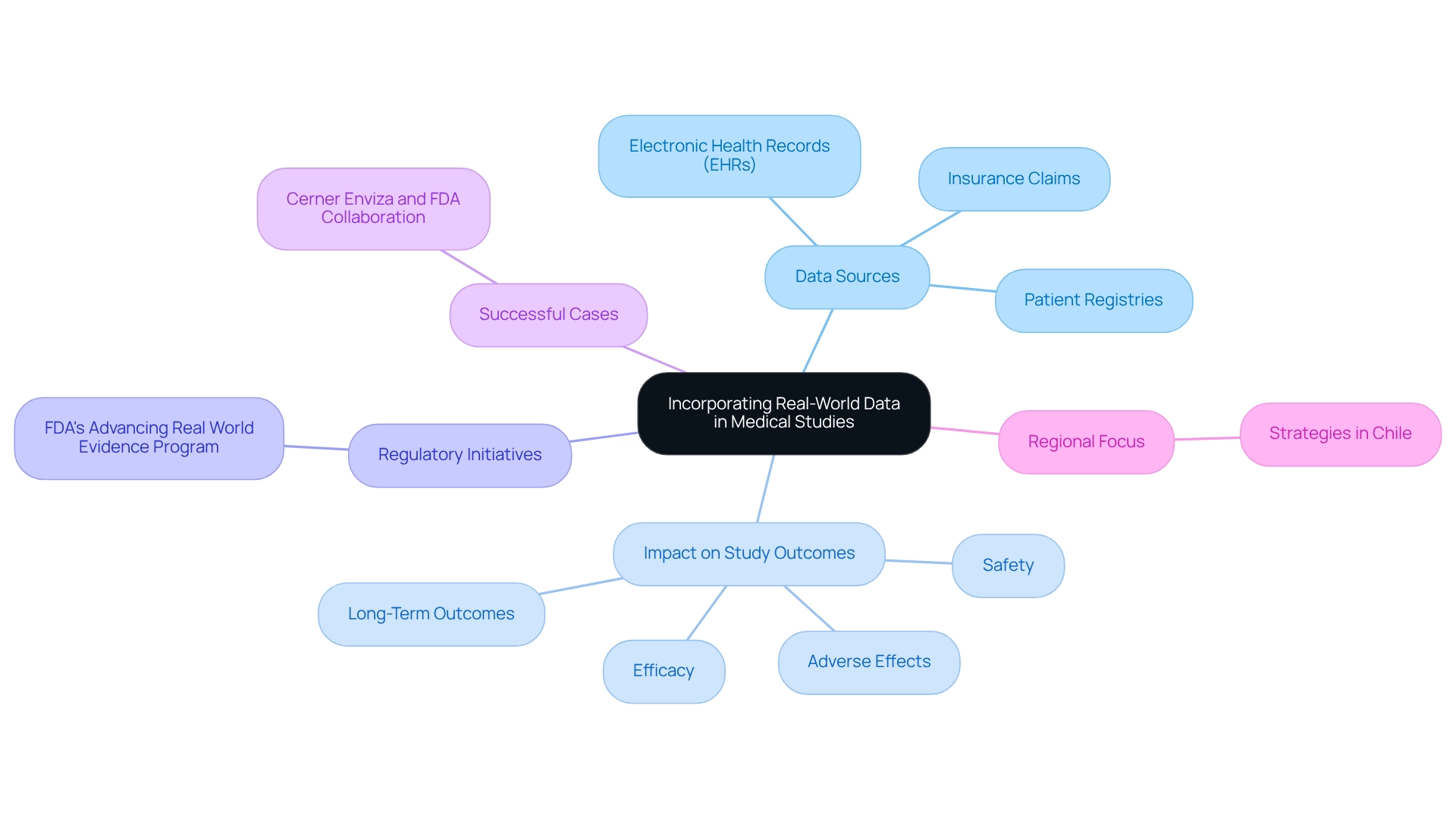
Capitalize on Chile's Commitment to Healthcare Innovation
This country is emerging as a leader in healthcare innovation, supported by substantial government backing and investments in medical technology. By 2025, a notable increase in healthcare innovation investments is anticipated, underscoring a commitment to enhancing the quality of care.
The Healthcare Providers Market in Chile is witnessing moderate growth, driven by an expanding population and heightened demand for quality care, which further reinforces this trend. Researchers can capitalize on this supportive environment by aligning their post-market study strategies in Chile with national health priorities and innovation strategies.
Collaborating with local health agencies and innovation centers not only provides access to essential resources and funding but also fosters partnerships that can enhance study outcomes. Engaging in local healthcare conferences and workshops is crucial for connecting with key stakeholders, thereby boosting the visibility and impact of initiatives.
Successful collaborations between Medtech companies and local health authorities have already showcased the potential for improved healthcare delivery and innovation in Chile, setting the stage for future advancements in the sector.
As bioaccess® emphasizes, their expertise in delivering cost-effective, high-quality clinical research services—including regulatory approval, clinical research site activation, subject recruitment, and trial data—can significantly enrich this landscape, generating jobs and stimulating economic growth.
As Yolanda Mega, Operations Manager, notes, 'The commitment to government support for medical technology is crucial for driving innovation.' Furthermore, highlighting bioaccess®'s direct contributions to local economies and healthcare enhancements illustrates the significance of collaboration in achieving successful outcomes.
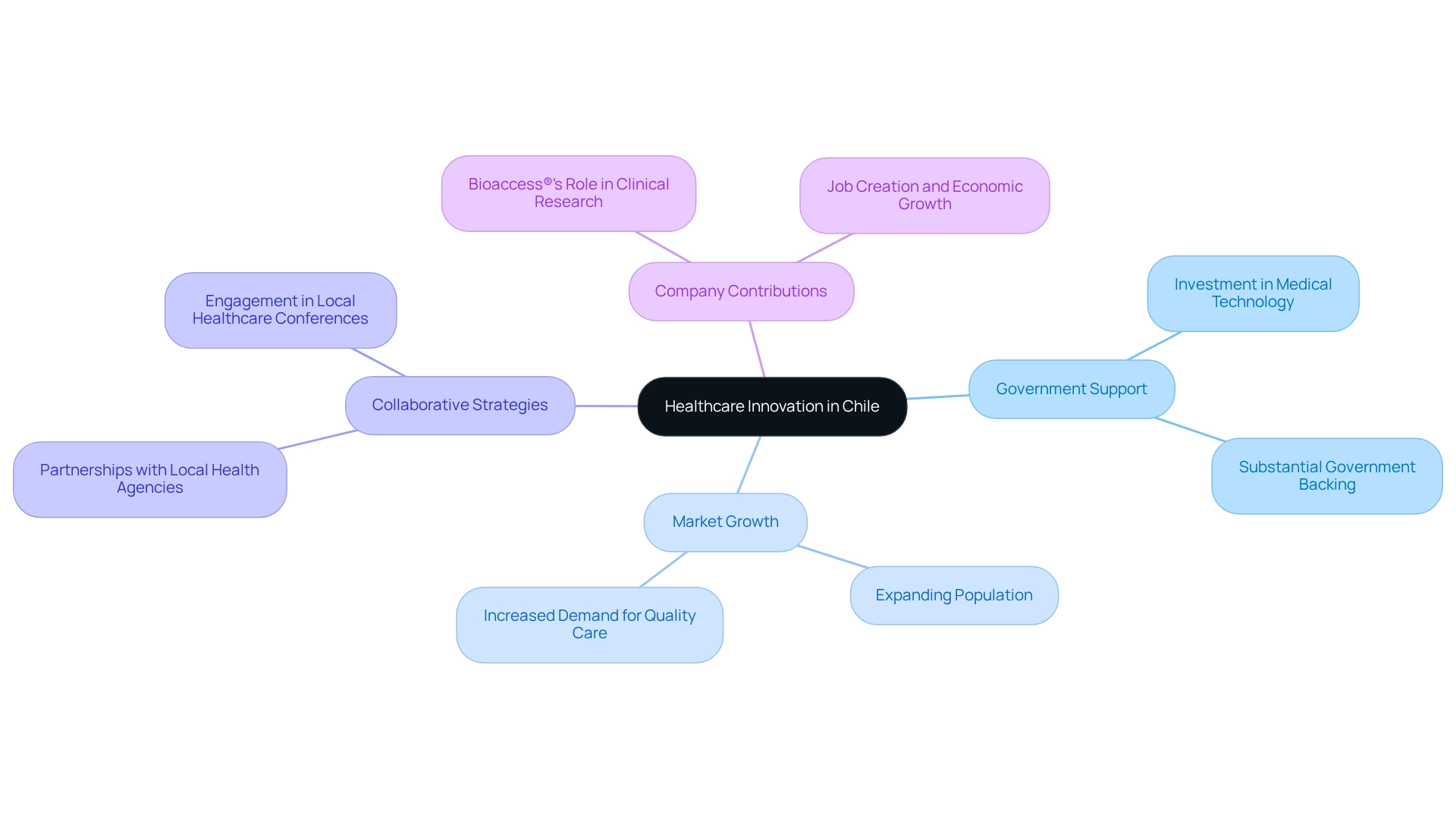
Conclusion
Chile's emergence as a hub for healthcare innovation and clinical research is underscored by its robust regulatory framework, skilled workforce, and commitment to cost-effective practices. The Instituto de Salud Pública (ISP) plays a pivotal role in ensuring that post-market studies are conducted with a focus on patient safety and research credibility, setting a high standard for compliance among researchers.
The country's rich demographic landscape enhances participant recruitment and facilitates collaborations with international research teams. Leveraging local resources and skilled professionals streamlines the research process and promotes the development of innovative healthcare solutions tailored to meet national health priorities. Successful case studies illustrate how these collaborations can lead to significant advancements in clinical research and healthcare delivery.
Moreover, the integration of real-world data into post-market studies enhances the understanding of medical devices' performance in diverse clinical settings. This comprehensive approach, supported by regulatory initiatives, is crucial for identifying long-term outcomes and improving patient care. As Chile continues to invest in healthcare innovation, aligning research efforts with local health authorities and innovation hubs will further bolster the effectiveness of clinical studies.
Ultimately, conducting post-market studies in Chile presents a unique opportunity to capitalize on a supportive environment for healthcare innovation. By prioritizing compliance, collaboration, and cost-effectiveness, researchers can contribute to impactful healthcare solutions that benefit local populations and position Chile as a competitive player in the global medical device arena. The future of healthcare research in Chile looks promising, driven by a commitment to quality, innovation, and collaboration.
Frequently Asked Questions
What organization governs the regulatory framework for post-market evaluations in Chile?
The regulatory framework for post-market evaluations in Chile is primarily governed by the Instituto de Salud Pública (ISP).
Why is it important for researchers to understand ISP guidelines?
Understanding ISP guidelines is essential for researchers as these guidelines mandate the development of post-market study strategies, which detail how a medical device will be monitored for safety and efficacy after market approval, thereby safeguarding patient safety and enhancing research credibility.
What is the focus of the ISP in 2025?
In 2025, the ISP emphasizes the importance of rigorous compliance and enhancing the integrity of clinical studies, along with providing regular training and updates on regulatory changes for researchers.
How does the demographic richness of Chile benefit medical research?
With a population of approximately 50 million inhabitants, the demographic richness of Chile enhances participant recruitment and facilitates collaboration with international research teams.
Can you provide an example of a successful post-market study strategy in Chile?
An example is a collaboration between a biotech firm and a Chilean university that led to the development of a telehealth solution, showcasing how adherence to ISP guidelines can unlock funding and support opportunities while fostering innovation in healthcare delivery.
What commitment does bioaccess® have regarding information security during trials?
Bioaccess® is committed to ensuring information security and client trust throughout the trial process, with established grievance and data protection procedures that address client concerns about compliance and transparency.
What advantages does Chile have in conducting medical trials?
Chile has a highly skilled workforce of medical experts, including doctors, nurses, and researchers, who are adept at conducting trials and implementing post-market study strategies. Partnering with local institutions equipped with advanced technology can streamline the investigation process.
What is the anticipated trend for research professionals in Chile in 2025?
The number of research professionals in Chile is anticipated to rise in 2025, reflecting a growing investment in the medical device industry, which has seen a 30% increase in funding over the past year.
What services does Bioaccess® offer for clinical trial management?
Bioaccess® offers a comprehensive range of clinical trial management services, including feasibility assessments, site selection, compliance evaluations, trial setup, import permits, project management, and reporting.
What innovative methods were implemented during the pandemic in Chile?
Innovative methods and contact-free epidemiological tools were implemented, serving as a reference for other researchers in similar situations or remote areas during the pandemic.
How did the Chilean government support vaccine research and access?
The Chilean government established a scientific advisory committee to foster cooperation between local and international organizations for vaccine research and access, which resulted in successful negotiations for vaccine procurement and a rapid national vaccination campaign.




